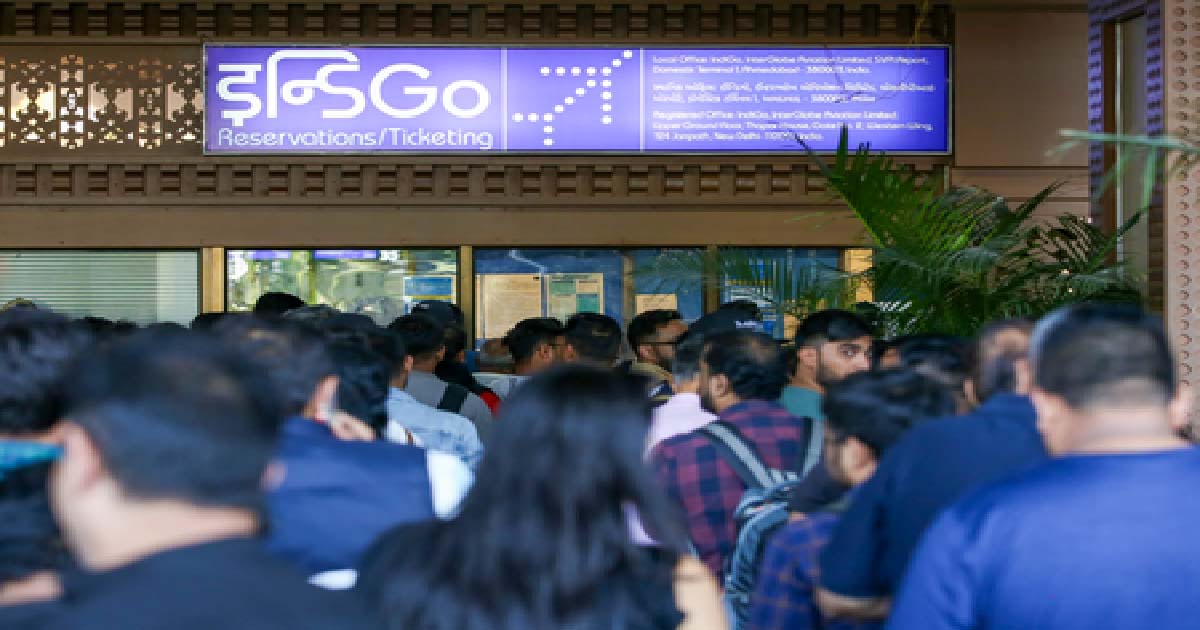Business
India’s air passenger traffic to surpass pre-Covid numbers: Scindia
India’s civil aviation sector has emerged stronger from Covid-19 and passenger traffic will surge to 410 million by 2024-25, surpassing the pre-pandemic numbers, Civil Aviation Minister Jyotiraditya Scindia said on Friday.
Before Covid struck, the passenger throughput (both domestic and international) was 344 million. With international operations set to resume from March 27, the minister exuded confidence that by 2022-23, the number will reach close to 300 million passengers and grow further to 410 million by 2024-25.
The minister was speaking at the inaugural session of Wings India 2022, Asia’s largest civil aviation show being held at Begumpet Airport in Hyderabad.
“I am confident in days to come, when you look at combination of domestic and international passengers, the throughput in India which was close to 344 million passengers in 2018-19 prior to Covid will reach close to 300 million by the year 2022-23 and by by 2024-25 we will surpass 410 million passengers creating a new history in India,” he said.
The minister said the aviation sector has gone through tremendous change during Covid. “The number of air passengers in India in 2018-19 was 140 million but then we got hit by Covid but even through this Covid period between the first wave and the second wave and between the second wave and the third wave if there is one sector which reemerged strongly it is the civil aviation,” he said.
He pointed out that post the second wave the sector recovered to reach close to 3.9 lakh passengers per day against the pre-covid number of close to 4.1 lakh passengers. “We were almost back to pre-Covid numbers but then Omicron came and again those numbers dipped to 1.6 lakh passengers per day. Post third wave numbers have again come back close to 3.83 lakh passengers,” he said.
“I am very confident that our sector in days and months to come with the next year will surpass pre-Covid number of 4.1 lakh passengers per day,” the minister added.
He said the international passengers were close to 60 million in 2018-19 but fell to almost 10 million, “But today I am glad that from day after tomorrow we are opening up 100 per cent of international operations so that India can once again reconnect to the rest of the world.”
Scindia said buildings of airports and other infrastructure powers the economic growth. “Civil aviation has an economic multiplier of 3.1. This means every dollar invested in the area of civil aviation yields economic output of 3.1 dollars. It is also an employment multiplier. The economicA multiplier effect is 1:6.1. It means that every direct employment created in area of civil aviation creates 6.1 indirect jobs. Both in terms of employment and output this is one of the largest employment and output generating sectors in the economy,” he said.
Airports Authority of India (AAI) chairman Sanjeev Kumar said domestic traffic has almost come to pre-Covid level and hoped that with the reopening of international air traffic from March 27, the international sector will also reach pre-Covid level soon. He exuded confidence that the double-digit growth would soon return to Indian aviation sector.
Stating that various stakeholders had paused expansion decisions due to the pandemic during last two years, he said the time has come to resume working on these decisions.
Civil aviation secretary Rajiv Bansal the sector is poised for remarkable growth. He said the growth would be across spectrum of the sector. He said UDAN scheme would be further strengthen to provide air connectivity to tier III and tier IV cities.
Ministers from France, Laos and Nepal and delegations from 22 countries are participating in the four-day event organised jointly by the Ministry of Civil Aviation and the Federation of Indian Chambers of Commerce & Industry (FICCI). Various stakeholders have set up 125 stalls in the exhibition area spread over 8,000 square meters.
Business
IndiGo offers travel vouchers worth Rs 10,000 to severely impacted customers

New Delhi, Dec 11: Limping back to normalcy, IndiGo on Thursday offered travel vouchers worth Rs 10,000 to customers who were severely impacted during the flight disruption earlier this month.
The airline “regrettably acknowledged” that several people travelling between December 3 and 5 were stranded for many hours at major airports nationwide. The crisis caused thousands of cancellations and delays, keeping passengers in long queues.
“We will offer travel vouchers worth Rs 10,000 to such severely impacted customers. These travel vouchers can be used for any future IndiGo journey for the next 12 months,” an IndiGo spokesperson said in a statement.
The compensation is in addition to the commitment under the existing government guidelines, as per which, IndiGo will provide compensation of Rs 5000 to Rs 10,000, depending on the block time of the flight, to those customers whose flights were cancelled within 24 hours of departure time.
IndiGo also noted that “all necessary refunds for cancelled flights have been initiated”, including bookings through a travel partner platform.
The airline said that it is “committed” to restoring a “safe, smooth, and reliable” experience.
Earlier in the day, IndiGo Chairman Vikram Singh Mehta said that the airline’s Board will bring in external technical experts to work with the management and identify the root causes behind last week’s massive flight disruptions.
He said the experts will help ensure that such large-scale operational failures never happen again.
Meanwhile, the company stated that all destinations in the airline’s network have been fully connected since December 8, and operations have stabilised since December 9.
On December 8, it flew more than 1,750 flights with just one same-day cancellation, and on December 9, it had over 1,800 flights and zero cancellations. Over 1,900 flights took off on December 10, while just two were cancelled on the same day.
On Thursday, IndiGo said it expects “to operate more than 1,950 flights with approximately 300,000 customers”.
Business
Sensex, Nifty turn volatile at open amid US Fed rate cut

Mumbai, Dec 11: Indian stock markets opened on a volatile note on Thursday, swinging between gains and losses even as the US Federal Reserve announced a 25-basis-point rate cut on Wednesday.
The Sensex, which began the day slightly higher, soon slipped into the red and was trading at 84,312 during early trade, down 79 points or 0.09 per cent. The Nifty also erased its early gains and inched down to 25,750, lower by 8 points or 0.03 per cent.
“From a technical standpoint, Nifty holds immediate support at 25,600–25,650, while the 25,850–25,900 zone continues to act as a strong resistance that has repeatedly halted upward momentum,” analysts said.
“A decisive breakout above this resistance band will be essential to re-establish bullish traction. Conversely, a sustained move below the identified support range may extend the ongoing consolidation phase,” they added.
Infosys, Eternal, Tata Steel, Maruti Suzuki, Adani Ports, HCL Tech, SBI, TCS, L&T, and Tech Mahindra were among the early gainers on the Sensex, rising up to 1.1 per cent. However, Titan, Power Grid, Bharti Airtel, NTPC, Asian Paints, ITC, Reliance Industries, Bajaj Finserv, and ICICI Bank dragged the market with mild losses.
In the broader market, the Nifty MidCap index slipped 0.17 per cent, while the Nifty SmallCap index dropped 0.32 per cent.
Among sectors, IT stocks led the gains, with the Nifty IT index rising 0.70 per cent. This was followed by the Nifty PSU Bank index, which was up 0.65 per cent, the Nifty Metal index up 0.4 per cent, and the Nifty Auto index up 0.12 per cent.
On the other hand, FMCG stocks came under pressure, pushing the Nifty FMCG index down by 0.26 per cent.
Analysts said that domestic markets tracked global cues cautiously as investors assessed the impact of the Fed’s latest rate cut on capital flows and economic growth.
Meanwhile, on the flows front, FIIs offloaded equities worth Rs 1,651 crore on December 10, while DIIs recorded net purchases of more than Rs 3,752 crore.
Business
BSE launches 4 new BSE 100 large-cap TMC universe factor indices

New Delhi, Dec 10: The Bombay Stock Exchange’s (BSE) subsidiary BSE Index Service on Wednesday announced the launch of four new factor Indices from the universe of BSE large-cap total market capitalisation (TMC) index with 5 per cent stock level capping.
The newly introduced indices are BSE large-cap 100 momentum 30, BSE large-cap 100 low volatility 30, BSE large-cap 100 enhanced value 30, and BSE large-cap 100 quality 30.
“BSE Index Services Pvt. Ltd., a wholly owned subsidiary of BSE, today announced the launch of 4 new BSE factor indices from the BSE 100 large cap TMC index as the universe with 5 per cent stock level capping,” the exchange said in a press release.
These Indices are Reconstituted Quarterly, have a base value of 1000, and the first value date is June 20, 2005, along with the additional screening for the liquidity profile, the release added.
BSE large-cap 100 Momentum 30 will track the performance of the 30 companies in the BSE 100 large-cap TMC that exhibit the most persistence in their relative performance, based on their momentum scores. Constituents are weighted based on their momentum score.
BSE large-cap 100 Low Volatility 30 will measure the performance of the 30 least volatile companies in the BSE 100 large-cap TMC. Constituents are weighted by their inverse volatility.
BSE large-cap 100 Enhanced Value 30 measures the performance of the 30 companies in the BSE 100 large-cap TMC with the most attractive valuations, based on their value scores. Constituents are weighted based on their value score.
BSE large-cap 100 Quality 30 measures the performance of the 30 companies in the BSE 100 large-cap TMC that exhibit the most persistence in their relative performance, based on their momentum scores. Constituents are weighted based on their momentum score.
“Building on the success of factor launches on the BSE 500 universe earlier in the year, we are pleased to expand our factor family with the launch of four new factor indices, this time on the large-cap universe,” BSE Index Services Pvt. Ltd MD & CEO Ashutosh Singh said.
“These indices, in the same vein as our BSE 500 universe factor family, will be reset on a quarterly basis with the introduction of an innovative score-based only weighting method,” he added.
The index said that these new indices can be used for running passive strategies such as ETFs and Index Funds.
It can also be used for benchmarking of PMS strategies, MF schemes and fund portfolios. Additionally, investors can now access a broader spectrum of market opportunities, further enriching their investment strategies with this latest addition to BSE’s suite of indices.
-

 Crime3 years ago
Crime3 years agoClass 10 student jumps to death in Jaipur
-

 Maharashtra1 year ago
Maharashtra1 year agoMumbai Local Train Update: Central Railway’s New Timetable Comes Into Effect; Check Full List Of Revised Timings & Stations
-

 Maharashtra1 year ago
Maharashtra1 year agoMumbai To Go Toll-Free Tonight! Maharashtra Govt Announces Complete Toll Waiver For Light Motor Vehicles At All 5 Entry Points Of City
-

 Maharashtra1 year ago
Maharashtra1 year agoFalse photo of Imtiaz Jaleel’s rally, exposing the fooling conspiracy
-

 National News1 year ago
National News1 year agoMinistry of Railways rolls out Special Drive 4.0 with focus on digitisation, cleanliness, inclusiveness and grievance redressal
-

 Maharashtra1 year ago
Maharashtra1 year agoMaharashtra Elections 2024: Mumbai Metro & BEST Services Extended Till Midnight On Voting Day
-

 National News1 year ago
National News1 year agoJ&K: 4 Jawans Killed, 28 Injured After Bus Carrying BSF Personnel For Poll Duty Falls Into Gorge In Budgam; Terrifying Visuals Surface
-

 Crime1 year ago
Crime1 year agoBaba Siddique Murder: Mumbai Police Unable To Get Lawrence Bishnoi Custody Due To Home Ministry Order, Says Report














